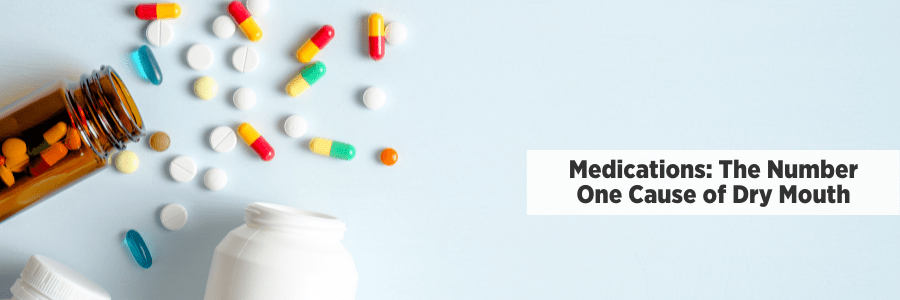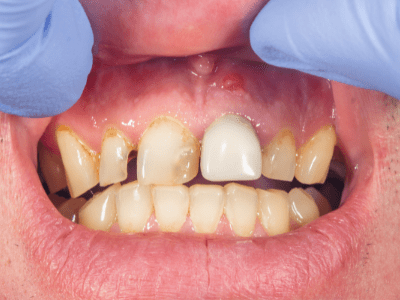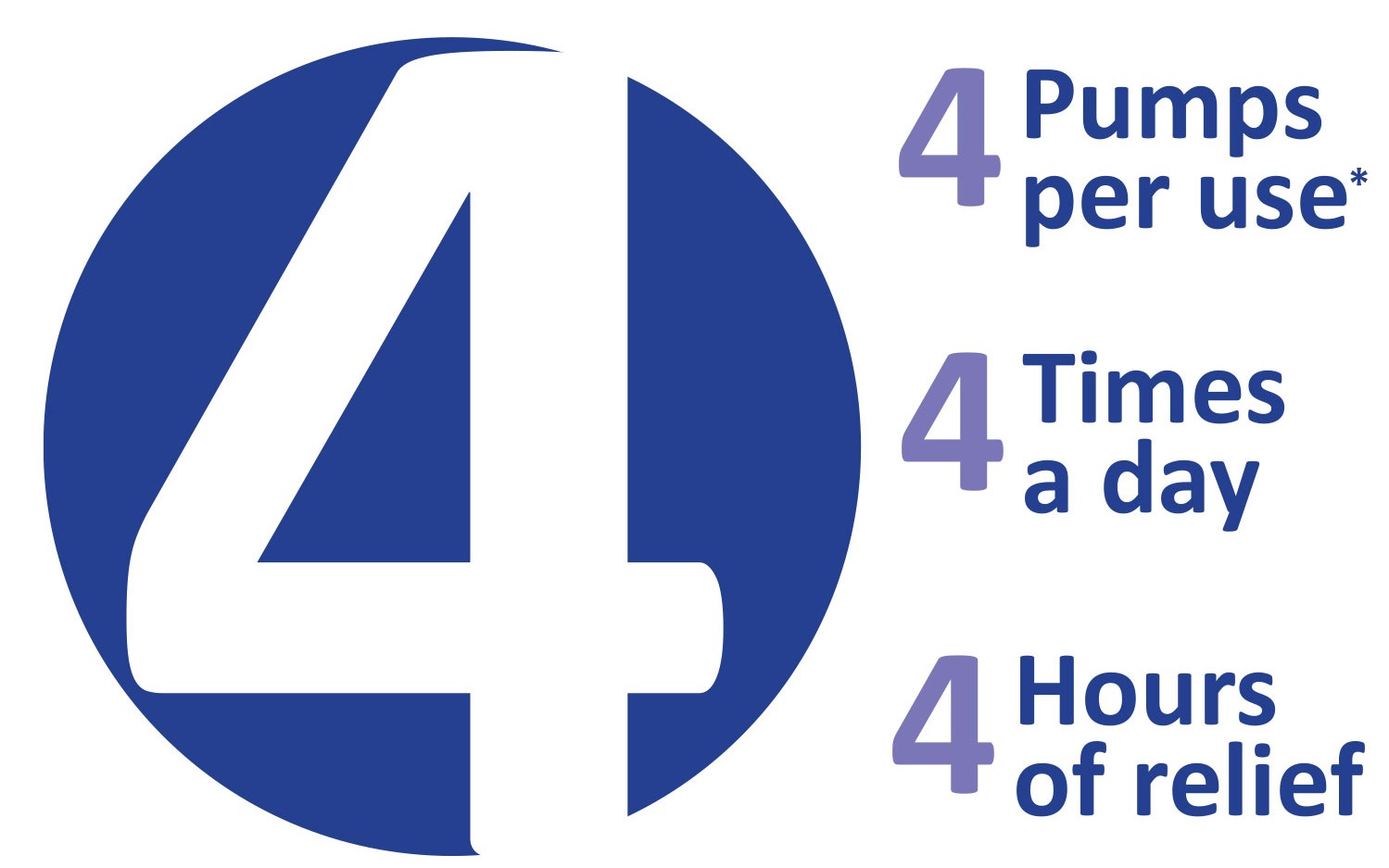Medications: The Number One Cause of Dry Mouth


Meet the Author: Sara Juliano, RDH
I have been a registered dental hygienist for over a decade. I have had the pleasure of working with amazing patients and educating them on their oral health throughout my career. Recently, I made the conscious decision to branch out within the dental field, choosing to maintain my dental hygiene license, and become a dental educator. With a passion for oral and systemic health, I have seen clinically the direct impact systemic health can have on oral health.
I will be extending my knowledge outside of the dental chair into the world and make an impact on the lives of others. Learn more about Sara, here.
With systemic health diseases on the rise, there has been an increase in the need for over-the-counter and prescription medications. In addition, the likelihood of a longer life span due to medical advances is a possibility for many. As a result, it is more likely for someone to need more medications as they continue to age.
Unfortunately, many medications list dry mouth symptoms as a side effect. While dry mouth symptoms may be uncomfortable on the surface, it is important to know how they can affect your overall health.
So why do medications typically cause dry mouth symptoms?
Dry Mouth as a Result of Medication
Our bodies naturally try to remain in a homeostatic environment to continue functioning properly. However, if there is a systemic disease or infection present that requires medication, this may disrupt or alter the normal function of the body. If homeostasis is not maintained, this may lead to dysregulation or disruption of the integral systems of the body.
Within the peripheral and central nervous systems, there are other and highly functioning systems. One of these specific systems is the cholinergic system.
The cholinergic system plays a significant role in neuroimmune communication. It helps transmit information from the peripheral nervous system to the central nervous system (CNS) and vice versa. This allows the whole body to communicate via systems to ebb and flow naturally, allowing the body time to heal and repair itself.
However, in the presence of disease and infection, most, if not always, medications are needed. This helps aid in regulating organ system disease and attempts to restore the body back to homeostasis.
Anticholinergic medications block the acetylcholine receptors that normally bind to the cholinergic system. Acetylcholine transmits nerve impulses throughout the central and peripheral nervous systems. Meaning, they carry responses throughout the cholinergic system, ultimately allowing it to function properly.
However, anticholinergic medications will inhibit natural acetylcholine attachment in the cholinergic system. As a result, nerve impulses are inhibited throughout the cholinergic system. This may reverse or alter the homeostatic function of the cholinergic system. If the cholinergic system is altered, this may dysregulate neuroimmune communication within the peripheral and central nervous systems disrupting communication throughout the nervous system to stop.
The Connection
Most often medications are used to treat a specific systemic health disease or infection. These medications are used to target the areas of the body that need necessary treatment and begin the healing process. However, these medications, as well as a systemic disease, may disrupt the homeostasis pattern.
When neurotransmitters, such as acetylcholine, attach themselves to cholinergic receptors, their function is to stimulate, increase, as well as excite salivary secretions as part of their normal function.
With anticholinergic medications present, acetylcholine cannot properly attach to its post-synaptic receptors. As a result, one cell that may not be stimulated is the exocrine acinar cells. Acinar cells produce salivary secretions specifically, mucous, and serous fluids.
If acinar cells are not properly being signaled to produce saliva, then there will be inadequate saliva production and dry mouth symptoms may follow. This is the connection between dry mouth and medications.
Oral Health Complications
Many medications may alter the function of the peripheral and central nervous systems, and the systems that reside within them, one being the cholinergic system. This may alter and dysregulate acinar cell secretion and reduce the level of saliva in the oral cavity, ultimately leading to dry mouth symptoms.
It is important to know dry mouth symptoms may increase one’s risk for oral health disease and infections.
Having a strong salivary flow contributes to:
- Neutral and healthy pH levels to reduce the risk of cavities
- Coat and moisten the oral cavity for comfort
- Sustain healthy microbiota levels and reduce foreign bacteria
- Aid in stimulating healthy digestion of food
- Contains protective ions that coat and strengthen enamel
- Activate healing properties and proteins after cuts, sores, burns, or dental procedures and dental surgeries

Long-term medication use may result in chronic dry mouth conditions. As medications may become a necessary integration for one’s health, there is an ever-growing need for knowledge and understanding on treating dry mouth symptoms. This may arrest or alleviate dry mouth symptoms and prevent oral health diseases and infections.
Ultimately, the correlation between oral and systemic health is vital to one’s health. Optimal oral health will decrease the risk for oral health diseases and may prevent any oral diseases from migrating systemically.
Lubricity Dry Mouth Spray
If you are looking for a product to relieve your dry mouth symptoms, try Lubricity Premium Dry Mouth Spray. Lubricity comforts and soothes your oral cavity providing a moisturized feeling.
Lubricity works differently from other solutions, forming a flavorless gel film that coats the mouth and penetrates oral tissue. This gel film provides lasting relief from even the most persistent dry mouth symptoms.
What is Lubricity?
Lubricity is an odorless, flavorless, and colorless spray that is perfect for people who are overly sensitive to taste. Our Dry Mouth Spray also has Zero Calories, NO Gluten, NO Alcohol, NO Sugar, and is Vegan-Friendly!
Lubricity Dry Mouth Spray has 5 simple ingredients: Hyaluronic Acid, Xylitol, Sodium Benzoate, Potassium Sorbate, and Purified Water. This simple formula is clinically proven to alleviate your dry mouth symptoms for up to 4 hours.
How to use Lubricity?
Lubricity Dry Mouth Spray comes in a convenient 0.5 oz and 2oz spray bottle. Simply point and spray 3-5 times per use. When used as directed, Lubricity provides up to 4 hours of relief from dry mouth symptoms.
For best results, we recommend using Lubricity Dry Mouth Spray as follows:

Use Lubricity after a meal and before bed. If needed, Lubricity can be used more than 4 times per day.
*Some may need 3-5 pumps per use, as the bottle needs to be primed upon opening. Relief from symptoms begins immediately. Maximum effectiveness is achieved after 72 hours of continued use.
Important: If you are pregnant or breastfeeding, please consult your physician before using Lubricity. DO not use Lubricity if you are taking any medications that are contraindicated with the product. Please consult with your physician if you have any concerns regarding the use of this product. Keep out of reach of children.
Lubricity is a Proud Supporter of the


What do customers say about Lubricity Dry Mouth Spray?
Cited Work:
Halder, N., & Lal, G. (2021). Cholinergic System and Its Therapeutic Importance in Inflammation and Autoimmunity. Frontiers in Immunology, 12, 660342. https://doi.org/10.3389/fimmu.2021.660342
de Araujo, I. E., & Simon, S. A. (2009). The gustatory cortex and multisensory integration. International Journal of Obesity, 33(S2), S34–S43. https://doi.org/10.1038/ijo.2009.70
Sam, C., & Bordoni, B. (2020). Physiology, Acetylcholine. PubMed; StatPearls Publishing. https://www.ncbi.nlm.nih.gov/books/NBK557825/





